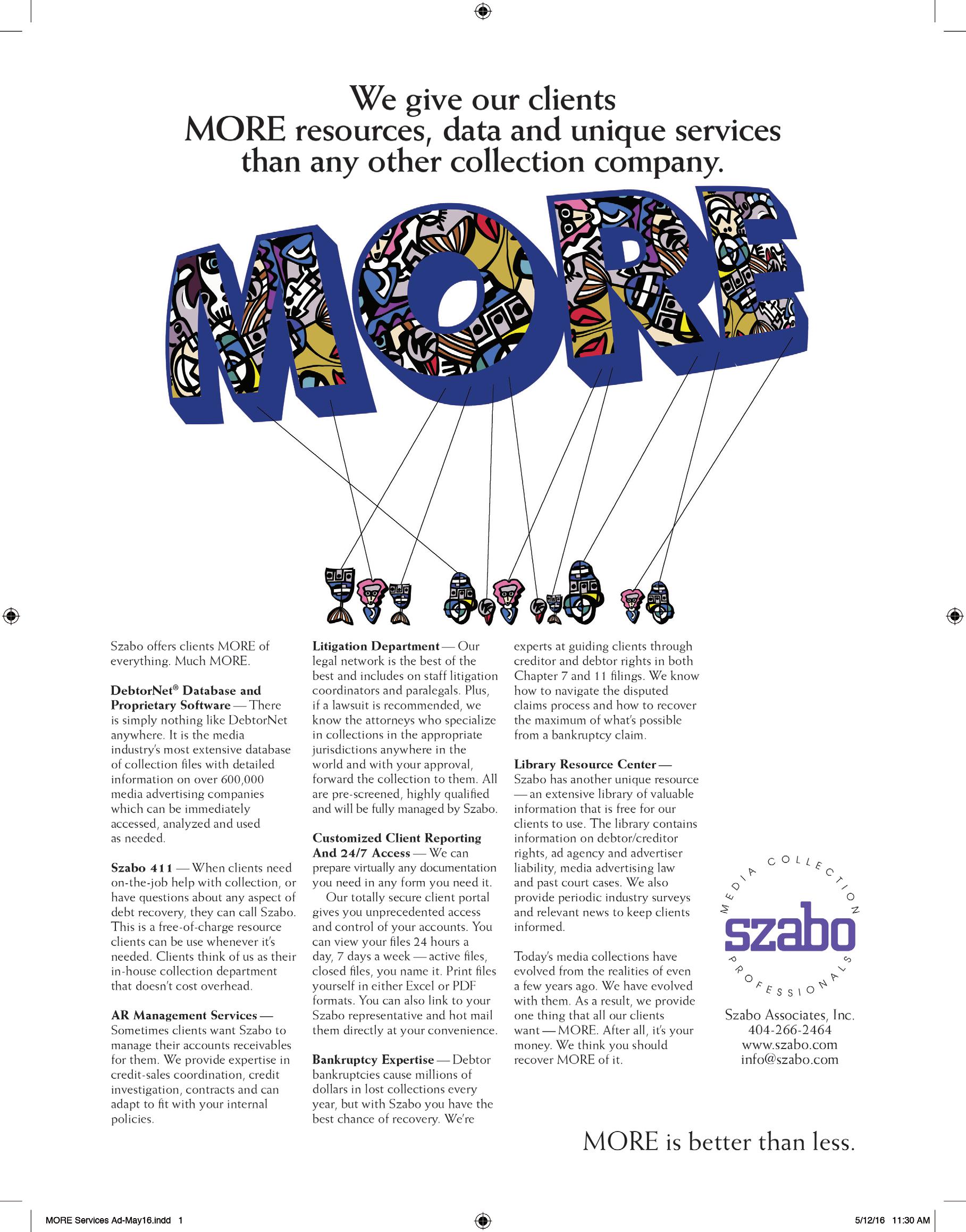
14 minute read
Last Word
The Cycle Begins
Do you know if your stations’ FCC inspection files are complete? Heed the requirements or pay the consequences later on. BY NANCY A. ORY
The Federal Communications Commission broadcast license renewal cycle has just started to kick in. Applications for radio stations in Washington, D.C., Maryland, Virginia and West Virginia were due on June 3. The radio renewal cycle will roll out every other month over the next three years, and the television renewal cycle will do the same starting in June 2020.
Now is the time to ensure that your station’s online public inspection file is in order. The license-renewal application requires licensees to certify that all documentation required by the FCC rules has been placed in the station’s public inspection file at the appropriate time.
Stations that have not properly maintained their files have to disclose on the renewal application that items are missing and/or have been filed after their due date. Stations with significant file omissions are advised to attempt to reconstruct missing information and outline steps taken to prevent such problems in the future.
Because public inspection files are now maintained on the FCC’s website, the commission’s staff can easily scrutinize the content of a station’s file and verify the timing of information uploads. Accordingly, it is essential that the online file be complete and that uploads are done on a timely basis. What’s more, any deviation from these requirements should be accurately disclosed in the license renewal application.
Stations should be aware that the FCC staff has already been reviewing online public inspection files. Last December it sent warnings to some licensees informing them that they have either failed to set up an online file or that certain material was missing.
Follow-up warnings were sent to licensees in mid-March. At that time, the commission staff asked stations to acknowledge receipt of the correspondence and submit information about when the licensee planned to upload all required information.
There are over 20 different types of information that are required to appear in the online public inspection file. They include station technical applications, ownership reports, equal employment opportunity (EEO) reports and audits, children’s television reports, quarterly Issues/Programs lists, time brokerage, shared service and joint sales agreements, must-carry and retransmission consent elections and political advertising information. Certain documents are automatically linked to the online public inspection file from other FCC databases (such as biennial ownership reports and children’s television reports). However, the station licensee still has an obligation to file the documents in a timely manner. More information is available at publicfiles.fcc.gov under the “About PIF” dropdown menu.
The FCC rules require stations to prepare a list of programs that have provided the station’s most significant treatment of community issues during the preceding three-month period, known as “Issues/Programs lists.” The list must include a narrative describing what issues were given significant treatment and the programming that provided this treatment, including the time, date, duration and title of each program.
Failure to prepare the Issues/Programs lists or the failure to include the requisite information in the list is likely to be the
biggest pitfall stations encounter with regard to the public inspection file. The FCC views these lists as important because they provide evidence of how a station has served the public in its local listening area. It’s not enough for the Issues/Programs lists to merely report the public service announcements aired by a station or the community events attended by station personnel. Instead, the station should thoughtfully create a list of issues of concern to the local Failure to comply community and then air programming that with the public specifically addresses the list of issues. Lists inspection file requirements will must be uploaded to the public inspection file by the 10th day of April, July, October and January. likely result in The second pitfall stations encounter with monetary fines and regard to the public inspection file is faildelay the grant of a license renewal ure to prepare and upload an annual EEO Public File Report, which is required of all station employment units with five or more application. full-time employees. EEO Public File Reports provide detailed information regarding a station’s hiring and employment practices and supplemental recruitment initiatives during the past year. The public file should include an EEO report for each year of the license term. Be aware that failure to comply with the online public inspection requirements will likely result in monetary fines and could delay the grant of your station’s license renewal application. To avoid such consequences, stations should take the time now to carefully review their online public inspection files and remedy any omissions or incomplete information.

Nancy A. Ory is an attorney with Lerman Senter PLLC. She can be reached at (202) 416-6791 or nory@lermansenter.com.
ORDER-TO-CASH PROFESSIONALS SELECT BCCA AS THEIR TOP RESOURCE FOR MEDIA SPECIFIC INFORMATION
BCCA… the media industry’s credit association



BCCA is the media industry’s premier provider of credit information, INDUSTRY SPECIFIC REPORTS1 education, and networking Exclusive source for BCCA Custom Reports and Media Whys Reports. opportunities. These enable Also available: Business Credit Reports; D&B Trade+; and Canadian/ International reports. Member can access all reports 24/7. members to efficiently manage credit risk and increase profitability. Our vision is to 2EDUCATION be a media-specific leader BCCA keeps order-to-cash professionals up-to-date with free that provides knowledge quarterly webinars, credit seminars, Media Finance Focus annual conference, and more. and strategic tools for order-to-cash optimization. 3NETWORKING
4 5





















































From BCCA's printed and online directories to the Media Credit Committee From BCCA's printed and online directories to the Media Credit Committee and in-person events, BCCA offers members multiple opportunities to be in touch with counterparts at other media organizations.


LIVE SUPPORT




















































Credit Investigation Specialists always available to help during Credit Investigation Specialists always available to help during business hours. BCCA has the extra investigation staff you need when you need it most.




























CUTTING EDGE TECHNOLOGY


























BCCA's Media Whys Report product includes APIs and is already integrated into some media industry back office automation programs.
Contact Arcelia Pimentel to learn more about BCCA and its solutions exclusively tailored for your organization.
APimentel@bccacredit.com • Phone: 847.881.8757 Ext. 104
Websites: bccacredit.com and mediawhys.com




